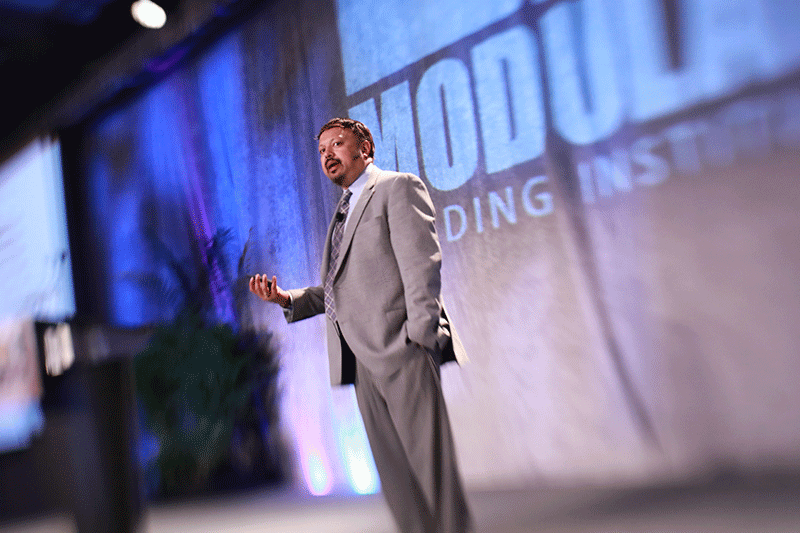Only the Future is at Stake
A new report from Anirban Basu, chairman & CEO of Sage Policy Group and Chief Economist of the Modular Building Institute

Anirban Basu is chairman & CEO of Sage Policy Group and Chief Economist of the Modular Building Institute
Climate Debates Get Heated
As of this writing, many of the world’s leaders are engaged in discussions at the 28th meeting of the Conference of the Parties to the United Nations Framework Convention on Climate Change, known simply as COP28. This year, the President of COP28 is none other than Sultan Al Jaber of the United Arab Emirates (UAE), who got the festivities started by suggesting that there is “no science” indicating that a phase-out of fossil fuels is required to restrict global temperate increase to 1.5 Celsius or 2.7 degrees Fahrenheit.
Many disagreed, loudly. As indicated by The Guardian, more than 100 nations already support phasing out fossil fuels. Whether the final COP28 agreement will call for a phase-out or will adopt diluted language is one of the most contentious issues at the summit.
As with many economic matters, there is underlying the tension between social goals and perceived economic well-being. For oil producing nations, the move away from fossil fuels represents something approaching an existential threat. According to the US Energy Information Administration’s International Energy Statistics database, the UAE was the world’s seventh-largest total liquid fuels producer in 2022 and third largest among OPEC members.

Anirban Basu speaks at MBI's annual World of Modular conference and tradeshow.
The movement away from fossil fuels also represents a source of inconvenience and cost among many American households. Many Americans like the flexibility and associated range of their gasoline-fired V-6s and V-8s. They like their gas stoves, propane-powered grills, and the rumble of a lawnmowers. Electrification would require abandoning many of the appliances and vehicles to which Americans have become accustomed. The transition to electric appliances and vehicles also stands to be expensive, as does electricity as utilities also shift away from fossil fuels.
For many onlookers, the world is engaged in a race. If the movement toward cleaner, greener economic activity takes too long, the world will suffer. While there are climate change skeptics, many leading scientists have concluded that the world will be fundamentally altered if the world warms by 1.5 degrees Celsius or more. Some conclude that at 1.5 degrees Celsius, 70 to 90 percent of coral reefs will die globally. At 2 degrees, the figure rises to approximately 99 percent. About 500 million people depend on those reefs for both food and livelihoods according to information acquired by NPR climate correspondent Lauren Summer.
Still others warn that at 1.5 degrees Celsius, the Greenland Ice Sheet would collapse, altering ocean currents. Degradation of the Amazon rainforest would further elevate emissions. Flooding would become rampant, destroying waterfront communities and tax bases in the process. Some scientists believe that the world is destined to surpass 1.5 degrees Celsius of warming, and the question is really what can be done to get the globe back to workable temperatures.
How Modular Building Can Help
Construction is infamous among the pantheon of industries in terms of its resistance to change. It is associated with slow productivity growth and modest evolutions in the mechanisms by which construction services are delivered. The reluctance to change is evident in the, which suggests that modular’s market share is edging higher as opposed to ramping higher aggressively.
That may be about to change, and environmental conditions have much to do with that. The bad news is that building operations and construction account for nearly 40 percent of global energy-related CO2 emissions. The good news is that changes in how construction services are delivered can supply major benefits in the war on climate change.
Environmental implications extend beyond waste produced. Noise pollution from construction sites disrupts local ecosystems, including impacting wildlife communication and behavior. Moreover, the industry stands as a major global consumer of resources, a fact highlighted by European Union data indicating that building construction consumes 40 percent of materials and primary energy while generating 40 percent of waste. Traditional construction techniques also impact water quality by injecting diesel, fossil fuels, paints, solvents, and other toxic chemicals into the environment.
Enter modular construction. By prefabricating components in a controlled factory setting, modular building minimizes waste, reduces onsite construction activities, and, as a result, significantly lowers overall environmental impacts. A noteworthy study by Professor Mohammed Al-Hussein at the University of Alberta reveals that modular construction could cut CO2 emissions by 43 percent on standard projects. This reduction is attributable to efficient use of resources and reduced construction time associated with modular methods.
There is more. A peer-reviewed study published in the Journal of Industrial Ecology and conducted by the University of Virginia indicates that modular homes typically use about 17 percent less material. If one extends that result to global housing requirements, the implications are mind-bending.
Looking Ahead
The Modular Building Institute along with other sources of leadership have been advocating for modular construction along several key dimensions, including cost containment, delivery speed, precision, appeal to emerging workforce members, and now the environment. As the race to reverse global warming intensifies, there is little doubt that modular techniques will be adopted with far greater frequency than has been the case to date. Meanwhile, modular building continues to offer its more traditional benefits to project owners, but the issues facing society are far more pressing these days than simply helping project owners make their pro-formas pencil out.
More from Modular Advantage
AoRa Development Aims for New York’s First Triple Net Zero Building Using Modular Methods
More cities are providing funding for newer infrastructure projects as long as they meet sustainability requirements. This is how modular can fit the bill, thanks to its lower waste production.
Developers and Designers: Lessons Learned with Modular Design
Modular construction is attractive to many developers because sitework and module construction can occur simultaneously, shortening the schedule and reducing additional costs.
UTILE: Putting Modular Building on a Fast Track
In Quebec, UTILE is taking the lead in creating affordable modular buildings to help decrease the student housing shortage. During the process, the company discovered what it takes to make the transition to modular building a success.
Sobha Modular Teaches Developers How to Think Like Manufacturers
With its 2.7 million square foot factory in UAE, Sobha Modular is bringing both its high-end bathroom pods to high-end residences to Dubai while developing modular projects for the U.S. and Australia.
RoadMasters: Why Early Transport Planning is Make-or-Break in Modular Construction
In modular construction, transportation is often called the “missing link.” While it rarely stops a project outright, poor planning can trigger costly delays, rerouting, and budget overruns.
Navigating Risk in Commercial Real Estate and Modular Construction: Insights from a 44-Year Industry Veteran
Modular projects involve manufacturing, transportation, and on-site assembly. Developers must understand exactly what they are responsible for versus what they subcontract. Risk advisors should research the developer’s contractors, subcontractors, and design-build consultants—especially the modular manufacturer.
Art²Park – A Creative Application of Modular and Conventional Construction
Art²Park is more than a park building—it’s a demonstration of what modular construction can achieve when thoughtfully integrated with traditional materials. The use of shipping containers provided not only speed and sustainability benefits but also a powerful structural core that simplified and strengthened the rest of the building.
Building Smarter: A New Standard in Modular Construction Efficiency
Rising material prices, labour shortages, expensive financing and tightening environmental rules have made conventional construction slower, costlier, and more unpredictable. To keep projects on schedule and within budget, builders are increasingly turning to smarter industrialized methods.
Resia: Breaking All the Rules
Resia Manufacturing, a division of U.S.-based Resia, is now offering prefabricated bathroom and kitchen components to industry partners. Its hybrid fabrication facility produces more precise bathroom and kitchen components (modules) faster and at lower cost than traditional construction. Here’s how Resia Manufacturing does it.
How LINQ Modular Innovates to Bring Modular To The Market in the UAE and Beyond
LINQ Modular, with an office and three manufacturing facilities in Dubai, is a modular firm based in United Arab Emirates. The company is on a mission: to break open the housing and construction markets in the Gulf Cooperation Council (GCC) area with modular.










